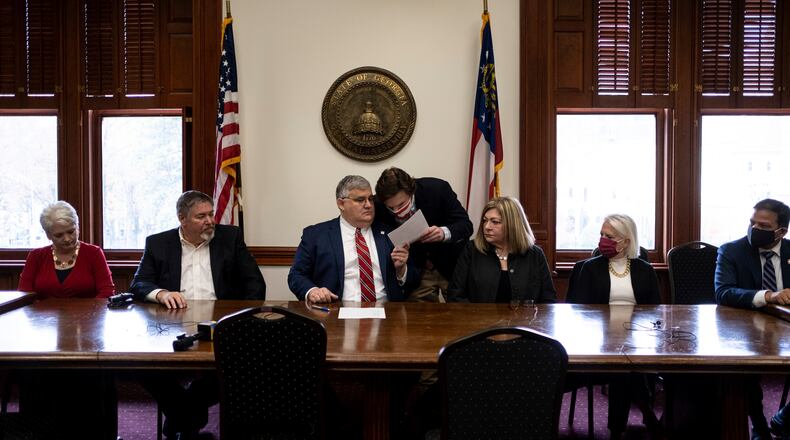Georgia’s 16 Republican electors will cast their ballots for Donald Trump and JD Vance on Tuesday, cementing the state’s electoral votes for the Republican presidential ticket in an oft-overlooked process that four years ago was anything but humdrum.
The contingent selected by party leaders this year to formally elect Trump is made up mostly of longtime activists and local GOP insiders, rather than senior Republican leaders long used to the glare of the spotlight.
And while the vote in the state Senate chambers will be a triumphant moment for Republicans still giddy from Trump’s Georgia victory, it will also offer a split-screen contrast from the effort four years ago to undermine Joe Biden’s narrow victory.
After Trump’s defeat in the 2020 election, he peddled false claims of widespread fraud and encouraged Republicans to elect their own symbolic slate of electors that put them on a collision course with the legal system.
As Democratic electors cast their ballots in the chambers of the Georgia Senate for Biden, Trump allies gathered quietly in a second-floor Capitol conference room and declared themselves the “duly elected” slate.
That vote, along with later revelations that Trump’s campaign urged the GOP electors to act with “complete secrecy,” set off a chain reaction that is still reverberating in Georgia.
Several of those GOP electors were charged in Fulton County’s ongoing racketeering case against Trump and his allies, including activist Cathy Latham, then-state GOP Chair David Shafer and Shawn Still, who later was elected to the state Senate. They each pleaded not guilty.
A fourth GOP elector, Burt Jones, was elected lieutenant governor in 2022 and is expected to launch a bid for Georgia’s top job next year. A judge disqualified District Attorney Fani Willis from pursuing charges against Jones, and in September a special prosecutor decided against seeking an indictment.
Credit: AP
Credit: AP
Now, the future of Willis’ election interference case against Trump and 14 other remaining defendants is in doubt, Jones is readying for a run for governor and several of the president-elect’s ascendant Georgia allies have been nominated to key posts in his incoming administration.
And Republican electors are set to frame the vote Tuesday as a celebratory moment that seals Trump’s victory in Georgia and across the nation ahead of the counting and certification of electoral votes at the U.S. Capitol on Jan. 6.
“This formal vote is the culmination of Donald Trump’s historic victory, cementing that Georgia is a center right state,” said Georgia GOP chair Josh McKoon, one of the state’s GOP electors.
A chain reaction
The process has come under scrutiny before. In 2016, the Republican contingent from Georgia was under siege to withhold votes from Trump after his stunning victory. Each promptly voted for Trump, though one recused himself months earlier and was replaced.
But little can compare to the scene that unfolded in 2020, when Democratic electors arrived at a heavily guarded Gold Dome still under pandemic-era restrictions as Trump’s allies stepped up their efforts to reverse his defeat.
As state officials braced for pro-Trump protests, several GOP electors told The Atlanta Journal-Constitution there were no plans to hold a rival meeting at the Capitol. Records obtained in a federal probe revealed they were under orders to maintain secrecy.
Credit: Alyssa Pointer / Alyssa.Pointer@
Credit: Alyssa Pointer / Alyssa.Pointer@
In an email sent Dec. 13, 2020, the day before electors met at the Capitol, then-Trump aide Robert Sinners urged the electors to act with “complete discretion in this process” and to keep it a secret from both the media and Capitol security guards.
As jubilant Democrats cast their ballots in the opulent Senate chambers — party leader Nikema Williams said the vote helped “restore the soul of our nation” — the Republicans gathered in a second-floor conference room to fill out their own “alternate” slate.
After the meeting, Shafer told the AJC the electors were assigned because the “election contest is not resolved,” and he pointed to a lawsuit that Trump’s campaign had filed in Fulton County over the results.
“In order for that lawsuit to remain viable,” he said, “we are required to hold this meeting.”
There was no evidence of widespread fraud, state and federal officials say, and judges at every level have dismissed lawsuits seeking to overturn the results in Georgia and elsewhere.
Credit: Alyssa Pointer / Alyssa.Pointer@ajc.com
Credit: Alyssa Pointer / Alyssa.Pointer@ajc.com
The state certified and recertified election results after three separate tallies of roughly 5 million votes. And investigations later debunked claims including drop box fraud, dead voters, invalid voter signatures and counterfeit ballots.
Shafer and other GOP electors, meanwhile, came under intense scrutiny. All 16 received target letters in 2022 notifying them they could face criminal charges, and eight subsequently struck immunity deals with Willis’ office in exchange for their testimony.
This year’s contingent of GOP electors, by contrast, is readying for a ho-hum process. They include McKoon, Cobb County GOP Chair Salleigh Grubbs and Jason Thompson, a member of the Republican National Committee.
Rufus Montgomery, a Capitol consultant and U.S. Army combat veteran who serves as an elector, said the moment isn’t lost on him.
“I am deeply honored to cast my vote for the leader our country needs at this critical time, Donald J. Trump.”
About the Author
Keep Reading
The Latest
Featured



